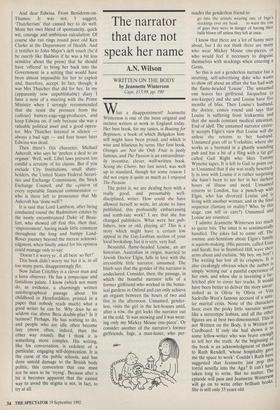The narrator that dare not speak her name
A.N. Wilson
WRITTEN ON THE BODY by Jeannette Winterson Cape, £13.99, pp. 190 hat a disappointment! Jeannette Winterson is one of the most original and incisive writers at work in England today. Her best book, for my tastes, is Boating for Beginners, a book of which Bulgakov him- self might have been proud, and which is wise and hilarious by turns. Her first book, Oranges are Not the Only Fruit is justly famous, and The Passion is an extraordinar- ily inventive, clever, well-written book. Sexing the Cherry, her last novel, was well up to standard, though for some reason I did not enjoy it quite as much as I enjoyed The Passion.
The point is, we are dealing here with a really good, and presumably well- disciplined, writer. How could she have allowed herself to write, let alone to have published, this profoundly embarrassing and tenth-rate work? I see that she has changed publishers. What were her pub- lishers, new or old, playing at? This is a story which might have a certain low appeal in the Gay-Lesbian section of your local bookshop, but it is very, very bad.
Beautiful, flame-headed Louise, an art historian, Australian in origin, married to Jewish Doctor Elgin, falls in love with the irresistible little narrator, unnamed. The blurb says that the gender of the narrator is undeclared. Consider, then, the passage, in which the boastful narrator tells of a former girlfriend who worked in the botan- ical gardens in Oxford and can only achieve an orgasm between the hours of two and five in the afternoon. Unnamed, gender- less, visits the girl in the hot-houses until, after a row, the girl locks the narrator out in the cold. 'It was snowing and I was wear- ing only my Mickey Mouse one-piece'. Or consider another of the narrator's former girlfriends, Inge, a man-hater, who per-
suades the genderless friend to
go into the urinals wearing one of Inge's stockings over my head . . . to warn the row of guys they were in danger of having their balls blown off unless they left at once.
I know that there are a lot of funny men about, but I do not think there are many who wear Mickey Mouse one-pieces, or who would feel it necessary to disguise themselves with stockings when entering a Gents.
So this is not a genderless narrator but a strutting, self-advertising dyke who wants to show off about an affair she has had with the flame-headed 'Louise'. The unnamed one leaves her girlfriend, Jacqueline (a zoo-keeper) and she and Louise have five months of bliss. Then Louise's husband, the doctor, comes round and says that Louise is suffering from leukaemia and that she needs constant medical attention. End of idyll. The unnamed narrator entire- ly accepts Elgin's view that Louise will die unless she returns to her husband. Unnamed goes off to Yorkshire, where she works as a barmaid in a ghastly sounding pub and has a bit of a fling with a fat girl called Gail Right who likes Tammy Wynette tapes. It is left to Gail to point out to Unnamed that if she was really besotted- ly in love with Louise it is rather surprising she hasn't been to see her in her darkest hours of illness and need. Unnamed returns to London, has a punch-up with Elgin, who has divorced Louise and is living with another woman; and in the final sequence (fantasy or reality? Who, by this stage, can tell or care?) Unnamed and Louise are reunited. I admire Jeannette Winterson too much to quote bits. The smut is so sentimentally handled. The jokes fail to come off. The routine anti-Semitism about Elgin's family is squirm-making. (His parents, called Esau and Sarah, live in Stamford Hill, wave their arms about and exclaim, 'My boy, my boy!) The writing has lost all its crispness. It JS also creakingly obvious when the author is simply 'writing out' a painful experience of her own, and when she is inventing a far- fetched plot to cover her tracks. It would have been better to deliver the story unvar- nished as in Olivia by Olivia or Vita Sackville-West's famous account of a simi- lar marital crisis. None of the characters lives; even the perky little narrator seems like a stereotype lesbian, and all the other figures are at best two-dimensional. This is not Written on the Body, it is Written on Cardboard. If only she had shown it to some fellow-writer who was brave enough to tell her the truth. At the beginning of the book is an acknowledgment of thanks to Ruth Rendell, 'whose hospitality gave me the space to work'. Couldn't Ruth havthie suggested that Jeannette just pop s torrid novella into the Aga? It can't have taken long to write. But no matter. The episode will pass and Jeannette Winterson will go on to write other brilliant books. She is still only 33 years old.


























































 Previous page
Previous page